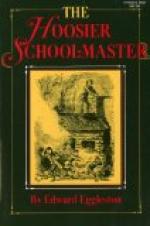Miss Martha received her perspiring lover most graciously, but this only convinced Bud more than ever that she was a superior being. If she had slighted him a bit, so as to awaken his combativeness, his bashfulness might have disappeared.
It was in vain that Martha inquired about his arm and complimented his courage. Bud could only think of his big feet, his clumsy hands, and his slow tongue. He answered in monosyllables, using his red silk handkerchief diligently.
“Is your arm improving?” asked Miss Hawkins.
“Yes, I think it is,” said Bud, hastily crossing his right leg over his left, and trying to get his fists out of sight.
“Have you heard from Mr. Pearson?”
“No, I ha’n’t,” answered Bud, removing his right foot to the floor again, because it looked so big, and trying to push his left hand into his pocket.
“Beautiful sunshine, isn’t it?” said Martha.
“Yes, ’tis,” answered Bud, sticking his right foot up on the rung of the chair and putting his right hand behind him.
“This snow looks like the snow we have at the East,” said Martha. “It snowed that way the time I was to Bosting.”
“Did it?” said Bud, not thinking of the snow at all nor of Boston, but thinking how much better he would have appeared had he left his arms and legs at home.
“I suppose Mr. Hartsook rode your horse to Lewisburg?”
“Yes, he did;” and Bud hung both hands at his side.
“You were very kind.”
This set Bud’s heart a-going so that he could not say anything, but he looked eloquently at Miss Hawkins, drew both feet under the chair, and rammed his hands into his pockets. Then, suddenly remembering how awkward he must look, he immediately pulled his hands out again, and crossed his legs. There was a silence of a few minutes, during which Bud made up his mind to do the most desperate thing he could think of—to declare his love and take the consequences.
“You see, Miss Hawkins,” he began, forgetting boots and fists in his agony, “I thought as how I’d come over here to-day, and”—but here his heart failed him utterly—“and—see—you.”
“I’m glad to see you, Mr. Means.”
“And I thought I’d tell you”—Martha was sure it was coming now, for Bud was in dead earnest—“and I thought I’d just like to tell you, ef I only know’d jest how to tell it right”—here Bud got frightened, and did not dare close the sentence as he had intended—“I thought as how you might like to know—or ruther I wanted to tell you—that—the—that I—that we—all of us—think—that—I—that we are going to have a spellin’-school a Chewsday night.”
“I’m real glad to hear it,” said the bland but disappointed Martha. “We used to have spelling-schools at the East.” But Miss Martha could not remember that they had them “to Bosting.”
Hard as it is for a bashful man to talk, it is still more difficult for him to close the conversation. Most men like to leave a favorable impression, and a bashful man is always waiting with the forlorn hope that some favorable turn in the talk may let him out without absolute discomfiture. And so Bud stayed a long time, and how he ever did get away he never could tell.




